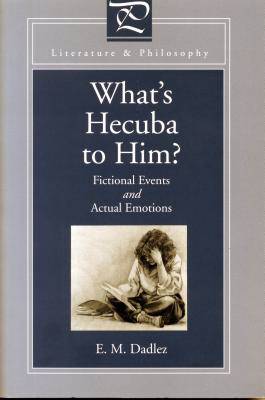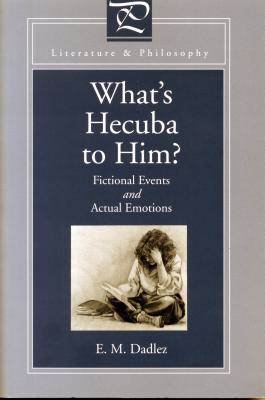
- Retrait gratuit dans votre magasin Club
- 7.000.000 titres dans notre catalogue
- Payer en toute sécurité
- Toujours un magasin près de chez vous
- Retrait gratuit dans votre magasin Club
- 7.000.0000 titres dans notre catalogue
- Payer en toute sécurité
- Toujours un magasin près de chez vous
Description
Fiction transports us. We inhabit new worlds in our imagination, adopt perspectives not our own, and even respond emotionally to persons and events that we know are not real.
The very nature of our emotional engagement with fiction, says E. M. Dadlez, attests to the possibility of its moral significance, just as the nature of our imaginative engagement makes us collaborators in the creation of the worlds we imagine.
This book engages contemporary debate over the seeming irrationality or inauthenticity of our emotional response to fiction, examining the many positions taken in this debate and arguing that we can understand the relation between cognition and emotion without devaluing our emotional responses to fiction. It takes Hamlet's famous query as the first step in an analytic philosophical inquiry and, by considering some of the answers that derive from that question, arrives at a set of necessary conditions for an emotional response to fiction.
What Hamlet's player feels for Hecuba, proposes Dadlez, is no more illusory than what we feel for Hamlet; that the actor weeps for Hecuba reflects both our capacity to envision and understand a seemingly limitless variety of human situations--to empathize with others--and the capacity of fiction to facilitate such understanding. What's Hecuba to Him? is an enticingly written work that opens an entire philosophical arena to literary scholars and illuminates the significance that literature has for our moral life.
Spécifications
Parties prenantes
- Auteur(s) :
- Editeur:
Contenu
- Nombre de pages :
- 252
- Langue:
- Anglais
- Collection :
Caractéristiques
- EAN:
- 9780271016511
- Date de parution :
- 15-09-97
- Format:
- Livre broché
- Format numérique:
- Trade paperback (VS)
- Dimensions :
- 154 mm x 229 mm
- Poids :
- 417 g

Les avis
Nous publions uniquement les avis qui respectent les conditions requises. Consultez nos conditions pour les avis.






